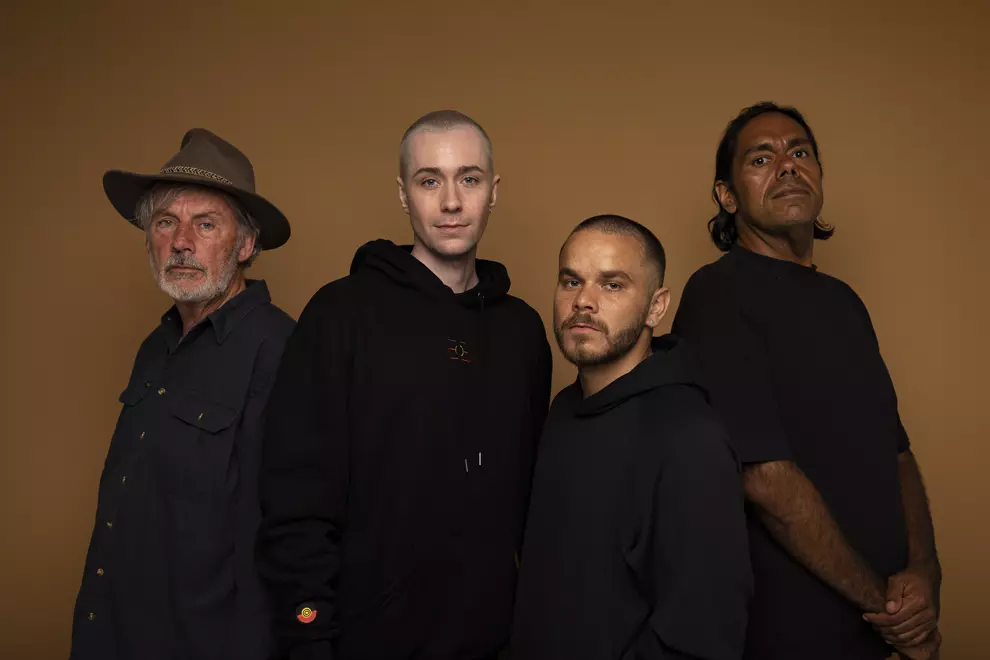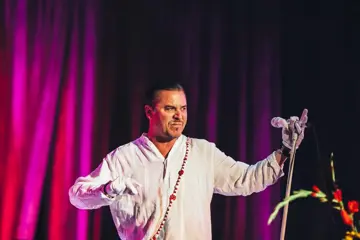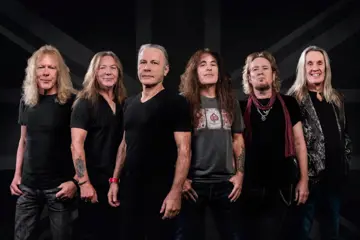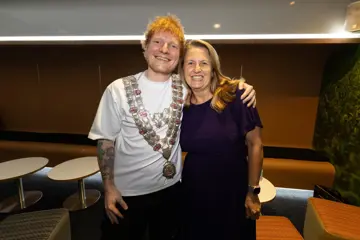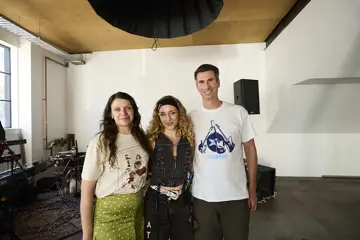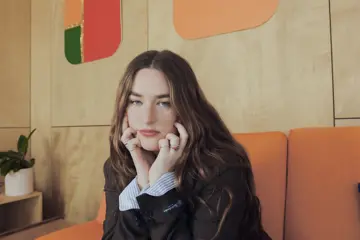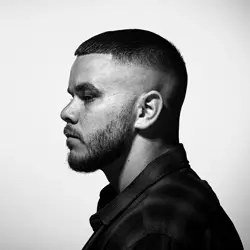 Tasman Keith
Tasman KeithSolid Rock is one of the most powerful Australian rock songs ever written, or perhaps one of the most potent songs ever written, period. With its pounding drums, driving guitar, and lyrics dealing with the stolen lands of Indigenous Australians, Goanna vocalist Shane Howard commanded everyday Aussies to stop and ponder our past. While it's not the first song to discuss land rights - Howard cited Ted Egan's Gurindji Blues in an interview with the ABC, a track that predated From Little Things, Big Things Grow by almost two decades - it was the first Australian rock song with those themes to take over mainstream radio.
Last year, Goanna celebrated 40 years of Solid Rock by releasing Solid Rock, Sacred Ground, featuring Emma Donovan's soulful vocal contributions and didjeridu playing from William Barton. The reworked hit also entailed a brilliant string arrangement by Ruth Roshan, performed by members of the Melbourne Symphony Orchestra.
Yesterday, Goanna released another version of Solid Rock, also with William Barton, but this time around, spearheaded by First Nations artist Moss and also featuring Tasman Keith. We caught up with Shane Howard, Moss and William Barton to learn more about the transformative new look at a classic Australian song.
Solid Rock is one of the most important Australian songs ever written. It inspires us to think, research and empathise with First Nations people. How did it feel to reimagine this song for a new generation?
Don't miss a beat with our FREE daily newsletter
Shane Howard: Technically, the credit really has to go to MOSS, who did all the heavy lifting on this recording. My role was to provide the ‘stems’, the component parts, from Goanna, but MOSS created the context and the production and mixing on this new version. I’m in awe of his ability to reimagine the song, the new recording, in such a modern and innovative way. It’s fresh, bold, and present and carries the message to a new generation of artists and audiences.
Moss: Solid Rock has inspired change for generations, and bringing this message to the forefront for the next generations has been empowering. These conversations are being had now more than ever, and it’s all part of a much longer history and healing. It’s an honour and full circle moment to take something so meaningful and maintain the same integrity and respect while also driving a new contemporary approach. Whether through arts, discourse or policies (as Tasman states on the record), I hope that this reimagining inspires people to dive further into educating themselves on the histories and take action for our future.
William Barton: Solid Rock has been a part of my life since being a part of the 30th and 40th anniversary of the song as well as meeting Shane Howard over 26 years ago. The song has a great meaning to me, and the song itself is a conveyor of the message of Indigenous People of Australia.
January 26 is a tough day for many First Nations people. Seeing the biggest protests ever shows that the tide is turning, though - how far have we come?
Moss: [January 26] was a powerful reminder that change is upon us, but we still have a long way to go. Only now are we seeing the honest recounts of these painful histories coming to light. The narratives presented by a dominant culture to rationalise their actions are now being challenged for their true nature. We’re still having the same conversations Solid Rock raised some 40 years ago, but there is so much more knowledge, respect and education being brought forward every day.
Barton: It’s important to always acknowledge our elders who have created a safe space for us to perform. The conversation started a long time ago, and a song like solid rock helps open up the conversation; it’s about acknowledgement.
Howard: I thought the tide was turning 40 years ago, when Solid Rock was first released and was so commercially successful. It felt like our generation was ready for change. But there are powerful forces, that are generally commercial or ideological that consciously work against those changes.
Much has changed in that time; the Mabo decision in the High Court, Keating’s Redfern speech, the Native Title Act, and Rudd’s Apology to the Stolen Generation. But I’m disappointed that change has been so slow for our First Nations brothers and sisters. I thought we would’ve been further down the track than we are by now. Treaty has been on the agenda since Hawke in the late 1980s. It’s coming, but slower than many would’ve hoped. Too many old people, who have now sadly passed, didn’t get to see justice in their lifetime. Now is the time to seize the moment and accelerate that change with truth-telling and meaningful Treaty, or we are little more than a nation of liars and thieves.
Solid Rock was the first Australian rock song to discuss colonisation and Indigenous rights. Sadly, many years later, we’re still having the same conversations. How does music push the conversation forward?
Howard: Plato says, “Music is a moral law.” Songs have been telling the story of history throughout all of human history. Folk songs have been telling the alternative view of history for a long time. History is written by the victors, which is one side of the story. The song is often the vehicle for telling the other side of the story by the little people without the power. When I heard Bob Dylan’s Times They Are A-Changin' album when I was very young, I understood the power of music to present another way of seeing the world. Those songs, like Lonesome Death of Hattie Carroll, With God On Our Side and Masters of War, not only changed my understanding but also gave me an army of like-minded people to belong to. It felt like being part of a movement for change.
Barton: Music is a form of expression; it comes back to the grassroots of music being a profound engine room, bringing people into the engine room of change.
Moss: Music has been the beating heart of knowledge and stories for tens of thousands of years. Information travelled this way on the land, so sharing this story reminds us of the injustices of Indigenous people and highlights them to a broader audience. With this comes more awareness and, hopefully, inspires others to be a part of the change.
How did this version of Solid Rock come together? I love that it showcases everyone’s personality and craft.
Howard: It’s a long story. William Barton invited me to perform Solid Rock on January 26th, 2021, at the Sydney Opera House as part of the NSW government’s concert, broadcast on ABC. I declined because of my personal beliefs about the date. The following year, William invited me again, and I agreed because I believed it could help to move the story forward. We were stuck in the politics of division. I spoke to First Nations Gadigal/Eora and Anangu Land Councils, singers, dancers and animators who supported the initiative. Anne Combe from Warner Music came to that event and was powerfully moved by the performance. This new version of Solid Rock grew from there.
I’ve known William since he was about 11 years old, and we’ve worked together over many years. His brilliance as a musician and cultural knowledge carrier is well known. I had the pleasure of working with Tasman Keith for the AFL Grand Final performance this year, and his poetic brilliance and cultural integrity moved me. MOSS I didn’t know until Warner brought him to my attention. He sent through a rough idea of what he intended for the track, and I was inspired by what this next generation of First Nations artists brought to the song. They’re all artists of excellence at their craft as well as powerful cultural advocates.
Barton: Over the years, I’ve been a part of the 30th and 40th anniversary of Solid Rock, and I first met Shane when I was 11 on Kalkadunga Country. So the song has been a part of my spirit over the years. Shane called me up while I was in Bremen on tour, and I had to quickly turn it around. I found a studio in Bremen, and they happened to have a didjeridu in the right key. I recorded that there, with the vision and insight of multi-tracking as part of the remix. Then Tasman and Moss worked their magic.
Moss: This started as an official remix for the 40th anniversary of the record, but as time went on, it took on a life of its own to the point where it became the reimagining it is today. We re-recorded Shane’s vocals and guitars, used AI to slice out backing vocals from the original and even had William record his didj parts in Germany while touring - so it’s been a big process! I always thought Tasman would have killed it on this take, and when we reached out, he was instantly on board, taking the record to a whole new level with his heavy-hitting verse. From old to new technology, it all combined to share this same message.
What do you think about the combination of rock, hip-hop and dance music bringing Solid Rock to a new generation?
Moss: I think we’re at a point in music where genres blend and collaborate, and this is a prime example. It allows listeners who come from all different tastes to tune in and not only hear a selection of new genres and sounds but also spread a deeper message while doing so.
Barton: I think it’s amazing for this iconic song of the Australian landscape to be cross genres and reach everybody out there for the first time to listen to the story. The music brings people in to listen to the truth. We have modern-day ingenuity and intelligence to create this new version of this iconic Australian song.
Howard: Initially, I wasn’t sure how the disparate elements could be brought together or if it would work at all. But I was deeply moved by the respect and integrity that this next gen of First Nations artists brought to the project. With each step we took, the idea kept growing and changing and emerging as a kind of modern-day songline. It paid homage to history but brought it into the present and the future. As I said, I’m in awe of the talent of MOSS in fusing all these elements together into a cohesive new reimagining. I’m humbled by the genius and hard work that the team have brought to the song.
I wrote Solid Rock because I dreamt of a better country where we could all be proud together. This version of the song embodies those dreams. Now we must all take up the challenge for meaningful change. We have everything to gain and nothing to lose but our colonial chains.
Solid Rock by Goanna, Moss, Tasman Keith & William Barton is out now. Stream/buy it here.

